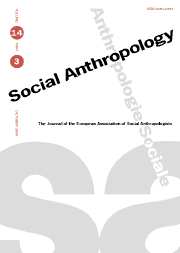No CrossRef data available.
Article contents
Abstract
The three essays in this special section of Social Anthropology/Anthropologie sociale are unusual in many respects, yet they represent a central aspect of what I believe to be the journal's intellectual mission. Twentieth-century European social anthropology has, under the influence of its predominantly British and French ancestors, concentrated on socio-cultural phenomena. If other European traditions in anthropology or ethnology maintained relationships with archaeology, folklore and literature, socio-linguistics, or biological anthropology, they were overshadowed by these dominant social anthropological traditions. The dominant European traditions themselves, while keeping up with North American cultural anthropology, rarely connected systematically with the other three of the North American ‘four fields’: linguistics, archaeology and biological anthropology. That is unfortunate, especially in the case of the latter. North American anthropology cannot be understood without going back on the scientific use of the biological category of ‘race’ that Franz Boas tried to combat by highlighting the notion of culture. Likewise, one cannot get a good sense of the history of European anthropology without attempting to understand why the history of social anthropology usually erases its historical origins in the biological inspiration that determined the work of figures like Cuvier, Prichard, Desmoulins and Darwin (see Huxley 1900 [1865]; Stocking 1973). We are still the heirs of Durkheim, Malinowski and Boas, for whom biology was, so to speak, the ‘significant other’ of the science of culture and society.
- Type
- Editorial
- Information
- Copyright
- Cambridge University Press 2004


